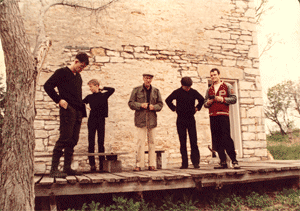- SPK (band)
Infobox musical artist
Name = SPK

Img_capt = SPK withWilliam S. Burroughs
Img_size =
Landscape = yes
Background = group_or_band
Birth_name =
Alias =
Born =
Died =
Origin =Sydney ,Australia
Instrument =
Genre =Industrial music ,Synthpop
Occupation =
Years_active = 1978-early 1990s
Label =Mute Records ,Side Effects Records
Associated_acts =
URL =
Current_members =Graeme Revell ,Sinan Leong
Past_members =Ne/H/il Dominik Guerin
Derek Thompson
Notable_instruments =SPK, formed in 1978 in
Sydney ,Australia , was a 1980s and early 1990sindustrial music andnoise music group. One member,Graeme Revell , would later go on to become a successfulHollywood movie composer.History
The group was formed when Revell (aka "Operator") met up with Neil Hill (aka "Ne/H/il"). They were both working at a
psychiatric hospital when they became inspired by themanifesto of the German radicalMarxist group known as the Sozialistisches Patientenkollektiv (SPK). The following words, inspired by the SPK manifesto, are used on one of the band's first recordings, "Slogun" (1979): "Kill, Kill, Kill for inner peace/ Bomb, Bomb, Bomb for mental health/ Therapy through violence!".Dominik Guerin (aka "Tone Generator") joined in 1980, and was later to concentrate on the band's notorious visual content. Guerin and Revell recorded the first album, "Information Overload Unit" (1981), in aVauxhall squat (during the Brixton riots in London) with the help of Revell's brother Ash (aka "Mr.Clean") and Wilkins (guitar/bass). After the recording of SPK's second album, "Leichenschrei" ("The Scream of the Corpse")(1982), they were joined by Sinan Leong, who had initially auditioned for a planned SPK side-project, "Dance Macabre". She and Revell were later to marry. In the first week of February 1984, just short of his 28th birthday, Neil Hill committed suicide two days before his wife Margaret Nikitenko died as a result of complications from anorexia.Other musicians working with SPK included Danny Rumor and David Virgin, who were on the bands first recordings that were done in 1979, James Pinker and Karel van Bergan, who toured the U.S. in 1982 with Guerin and Revell, Brian Williams of
Lustmord , John Murphy of Forresta di Ferro (better known asKraang ) and Derek Thompson, who later had a brief stint inThe Cure and went on to record asHoodlum Priest . Thompson claims that he left SPK when founder member Revell wanted to take the band in what Thompson perceived as a more commercial direction [cite web|url=http://www.aracnet.com/~jester/interview/hoodlum.priest.interview.html|title=Interview with Derek Thompson of Hoodlum Priest|date=January 7 ,1998 |accessdate=2007-01-04] .William S. Burroughs the American writer was photographed with the band at his home in Lawrence, Kansas in 1982. From left to right: Graeme Revell, Karel vanBergan, William S. Burroughs (uncle Bill), Dominik Guerin, and James Pinker.Acronym
The meaning of the SPK abbreviation is deliberately unclear; the album covers suggest several different alternatives. The most well known is Sozialistisches PatientenKollektiv, but there are also others, such as "Surgical Penis Klinik", "System Planning Korporation" and "SePuKku".
Works
The most notable recordings of SPK are early: "Information Overload Unit", "Leichenschrei" and "AutoDaFe". SPK's music is best described as disturbing and psychologically disorienting, in line with their nihilistic,
subversive philosophy. Live performances included video backing (some of which was issued in two "Twin Vison" videos, "Despair" and "Two Autopsy Films"), trangressive performances with animal carcasses and other attempts to make the audience uncomfortable. The group issued manifestos, such as DoKuments 1 and 2, "The Post-Industrial Strategy", which appeared inRE/Search 's "Industrial Culture Handbook" [cite book|date=1983|publisher=RE/Search |title=Industrial Culture Handbook ] . There is a clear dichotomy between early industrial SPK (1978- 83) and the more commercial music inspired by Graeme Revell. Later releases, such as "Machine Age Voodoo" (1984), were moresynthpop -oriented than industrial. Still later, the group moved into electronic orchestral work, with the release of "Zamia Lehmanni: Songs of Byzantine Flowers" (1986).Discography
Albums
* "
Information Overload Unit " - LP/CD - 1981
* "Leichenschrei " - LP/CD - 1982
* "Machine Age Voodoo " - LP - 1984
* "" - LP/CD - 1986
* "" - LP/CD - 1987
* "Oceania" - LP/CD - 1988Compilations
* "
Auto Da Fé " - LP/CD - 1983
* "Box" - CD - 1992ingles, EPs, cassettes
* "No More/Kontakt/Germanik" - Single - 1979
* "Factory"/Retard/Slogun" - Single - 1979
* "Mekano/Kontakt/Slogun" - Single - 1979
* "Meat Processing Section" EP (Slogun/Mekano) - Single – 1980
* "See Saw/Chambermusik" - Single - 1981
* "SoliPsiK" - Single - 1981
* "At The Crypt" - Cassette -Sterile Records - 1981
* "Last Attempt at Paradise" - Cassette - 1982
* "Dekompositiones" - 12"EP - 1983
* "From Science To Ritual" - Cassette - 1983
* "Metal Dance" - Single - 1984
* "Junk Funk" - Single - 1984
* "Flesh & Steel" – Single - 1985
* "In Flagrante Delicto" - Single – 1986
* "Off the Deep End" - Single - 1987
* "Breathless" - Single - 1987
* "Digitalis Ambigua: Gold & Poison" - Single - 1987Videos, Films
* "Despair" - SPK Video by Twin Vision - 1982
* "Two Autopsy Films" - SPK Video by Twin Vision - 1983References
External links
* [http://www.graemerevell.com/ Homepage of Graeme Revell]
* [http://www.vogania.com/MUSIC/SPK.html OfficialSite; Tone Generator (2007) ]
* [http://home.pi.be/~spk/ Information Overload Unit - archive of early]
* [http://www.users.bigpond.com/pturnbul/nns_others.htm No Night Sweats - firstlineup ]
Wikimedia Foundation. 2010.
